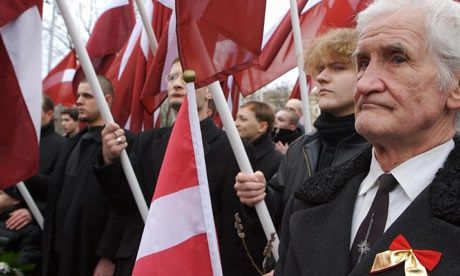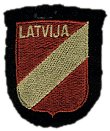Originally posted at www.theguardian.com, published 2 October 20091, our emphases.
To call us Nazi sympathisers is absurdIt is a slur to claim that, in honouring Latvians who fought Soviet oppression, my party supports abhorrent Nazi ideology
 Former Latvian SS legion members and their families gathered 16 March 2007 to lay wreaths in memory of fallen Legionnaires at the Freedom Monument in Riga (Photograph: Ilmars Znotins/AFP/Getty Images ILMARS ZNOTINS/AFP/Getty Images)
Former Latvian SS legion members and their families gathered 16 March 2007 to lay wreaths in memory of fallen Legionnaires at the Freedom Monument in Riga (Photograph: Ilmars Znotins/AFP/Getty Images ILMARS ZNOTINS/AFP/Getty Images)Over the years Efraim Zuroff has made a number of biased statements about the Latvian Legion of the Waffen-SS, but I am afraid I simply cannot accept his view that the LNNK – the Fatherland and Freedom party – in any way honours Nazi crimes or encourages the revision of European history. Warnings on some kind of "campaign to rewrite the history of the second world war" expressed by Zuroff resemble the Russian propaganda cliches declaring that crimes committed by totalitarian communist regimes are justified as a historical necessity.
My party has never justified Nazi war crimes or tried to glorify Nazi military units. It is simply absurd to declare that Latvians who wish to honour their compatriots who fought and died in the second world war have any sympathy for the abhorrent ideologies that were responsible for the death of so many of my people and that plunged my nation into decades of occupation by Nazi and Soviet oppressors. We are happy to have a debate with others over what kind of commemoration service they think may be appropriate for our fallen soldiers, but I will not accept that such a service is in any way an effort to "whitewash" history.
My party is one of the oldest in Latvia, and has been represented continuously in the national parliament since independence in 1993. Its conservative policy has always been directed to the goal of Latvia's membership of Nato and the European Union.
As Zuroff rightly mentions, the Latvian Legion was established only at the beginning of 1943, about a year after the last mass murder of Jews in Latvia. Therefore there is no reason to claim that there were any direct links between the legion and the war crimes previously committed by military or paramilitary organisations. 1Zuroff seeks to establish links between self-defence units, police battalions and the Latvian Legion – but the bottom line is that there is no evidence for these links.
At the very end of the war, people who had committed war crimes joined the Nazi party and the security services of the SS, but that does not mean that the entire Latvian Legion was a criminal organisation. It is self-evident that no community can be judged on the basis of what individuals have done.
Latvian soldiers did not take part in any slaughter of civilians; they fought against the military might of the Soviet Union. Only a few years earlier, in 1940, the Red Army had put an end to the country's independence, killing and deporting countless civilians. Furthermore, there has never been a court case in which a member of the Latvian Legion has been accused of war crimes that have been committed in the context of the legion.
Thousands of Latvians were conscripted by both Nazi Germany and the Soviets, under threat of imprisonment or death, to fight in the second world war. Members of the Latvian Legion, though carrying the German-imposed designation "SS", served as combat soldiers and were exonerated by the Nuremberg trials.
As the US government said in an official statement2 in 1950, the "Waffen-SS units of the Baltic states are to be seen as units that stood apart and were different from the German SS in terms of goals, ideologies, operations and constitution". That is why the US and Britain allowed surviving conscripts to settle as political refugees after the war.
As regards the commemoration event Zuroff mentions in his article, it is often attended by members of many parties, including the government coalition and those affiliated to the EPP and Green groups in the European parliament. In addition, it seems that Zuroff has not been informed that the annual "march" of the veterans in Riga has not taken place for the last few years.
I am proud of the new European Conservatives and Reformists group we have formed in the European parliament. Its foundations are strong, and the more bile and mud thrown by the leftwing press and domestic opponents, the more united and resolved we have become.
When we first formed our new group with the British Conservatives and others, the Times sent a reporter to investigate my party. His report began: "The trek across eastern Europe to find David Cameron's Nazi-loving friends came to a wholly unsatisfactory conclusion yesterday. It turns out they are just a bunch of sweeties."
In light of this true and clear conclusion one should raise a question as to what are the real reasons for Zuroff to take pains to bring this issue back again. If there is any "insidious plan" at all, then it is Zuroff's insidious intention to harm the British Conservatives and intervene in the UK's domestic policy issues.
Examination
In line with Zīle's statement here, materials on the Holocaust and Judaica often conflate or equate:
- the pre-war Aizsargi (national guard),
- Latvian fascist Pērkonkrusts ("Thundercross" party),
- Sicherheitsdienst ("SD units", the intelligence service of the SS and architects-executors of the Holocaust)
- Schutzmannschaft ("Schuma", police auxiliaries),
- Waffen-SS ("Latvian Legion"), and
- Askaris (Russian POWs)
Briefly:
- The Aizsargi were disbanded in 1940 upon the first Soviet invasion. It leader, Kārlis Prauls, was shot to death and buried in woods. It took three years to find his grave. 80% of its officers — 2,220 — were deported or killed. The Aizsargi had no role as an organization during the Nazi occupation.
- The pre-war fascist party Pērkonkrusts was not, as is widely alleged, the backbone of the notorious Arājs Kommando collaborators. Arājs's trial established that no more than three or four of his unit had been Pērkonkrusts members.
- Arājs Kommando was subordinated to the Sicherheitsdienst ("SD", SS intelligence and architects of the Holocaust). They numbered 300-500 during the Holocaust, some 1,200 in later action in Byelorussia.
- The vast majority of Schutzmannschaft units were dispatched to serve under the Wehrmacht on the Eastern Front and had no Holocaust involvement. These units were initially incorporated into the Latvian Legion in 1943.
- The Latvian Legion (Waffen-SS) were majority-conscripted and served under the Wehrmacht against the Red Army on the Eastern Front. The Legion numbered some 57,000; however, the total number of Latvians mobilized was 110,000 (estimates range from 100,000 to 140,000). The other main destination for mobilized Latvians beside the Legion was sapper units doing digging and construction in combat support.
- The Askaris, Russian POWs who fought against the Red Army, are described as Ukrainians, Estonians, Latvians, and Lithuanians in Soviet-Russian archives. Tainted "archives" have erased the fact Russians ever fought against the Red Army. The larger issue is that Soviet, now Russian, archives are replete with manufactured evidence, a remnant of history serving politics throughout the Soviet era.
Behind the headline
Since the publication of Zīle's response to Zuroff's attack, the LNNK merged with the National Alliance in 2011 and ceased to exist as an independent political part. More information on the party is available on Wikipedia.
| 1 | Roberts Zīle's commentary published at www.theguardian.com/ |
| 2 |
Dr. J. Feldmanis Dear Dr. Feldmanis: Please pardon the delayed acknowledgment of your letter of August 2, 1950. By now, of course, you know the decision of the Commission. It has approved the following motion: "That the Waffen-SS. Units (Baltic Legions) are to be considered as separate and distinct in purpose, ideology, activities, and qualifications for membership from the German SS, and therefore the Commission holds them not to be a movement hostile to the government of the United Stated under Section 13 of the Displaced Persons Act, as amended." Sincerely yours, Commissioner |
